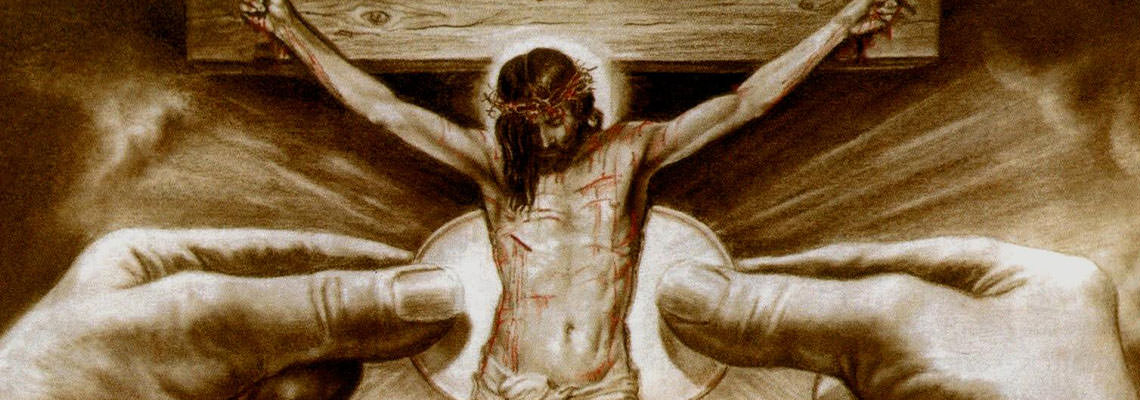It is 1st April 2021.
We begin the Sacred Triduum with the Holy Thursday in which we commemorate the Lord’s Supper of our Lord Jesus. The readings are from Exodus 12:1-8,11-14; the second reading is from 1 Corinthians 11:23-26 and the Gospel from John 13:1-15.
It is the day to reflect on New Lamb, New love, New liberation, and new liturgy. The ‘hour’ of Jesus has come.
Love never ends or gets tired. Love of Christ is consistent and constant always. There are four salient elements of our faith are explained with the celebration of Holy Thursday. Christ instituted the Eucharist, the Sacrament of His Body and Blood. by telling this is my Body and my Blood, the ministerial Priesthood remember the New Pasch, washing of feet of the apostles including the one who is going to betray Him, and New Commandment of love.
Love of Christ is the agape, the uncontaminated, unconditional, and self-giving love for the other. He loved us till the end. Love is the permanent medium of communication of God through His beloved Son Jesus. Love of Jesus is not for a particular group of people or a race but for all people. Jesus connects service and sacrifice. Without these two, we cannot continue to profess our faith in Jesus and to be His disciples. Jesus stoops down as a servant to wash our sins clean. If we want to have the share of blessings, we too have to wash or serve the other in front of us. The Eucharist is the sacrifice propels us to be at the beck and call of the others. Eucharist is a memorial of the humble service of Jesus even to the point dying for us all. We are no longer a believer in the absence of service. It is the life-giving meal that leads us to life giving sacrifice.
The first reading presents us with the maiden Passover celebration of the Jews. The Passover is a day of festival for all generations, for ever. “This day is to be a day of remembrance for you, and you must celebrate it as a feast in the Lord’s honour. For all generations you are to declare it a day of festival, for ever.” (Ex.12:14). God wants to enter our lives to remove the sins and its shadows. As the blood of the lamb protected the Jews, so the Blood of Christ offers salvation to all. It is the time to come out of our slavery to freedom in Christ.
St. Paul traces and imparts the tradition of celebrating the Eucharist in the early church. “For as often as you eat this bread and drink the cup, you proclaim the Lord’s death until he comes.” (1 Cor.11:26). He convinces us to be partakers and to repeat the memory of liberation Jesus brought to each one of us. There is a connection between the Jewish Passover and Paschal Meal; the entire Paschal Mystery of Jesus: suffering, death, and resurrection. And linking the Eucharist with the sacrifice and resurrection of Jesus. It is easy to offer some money to the poor and pacify our conscience but what is required is forgiving those who have hurt us. Forgiveness is the sacrifice that pleases God.
The responsorial Psalm praises, “Our blessing-cup is a communion with the Blood of Christ.” (1 Cor.10:16).
The demonstration of love in action is the Eucharist and the service-filled priesthood. Love is not mere a feeling, but it is warm-filled and thoughtful actions. Jesus washed the feet of the Apostles and reminding us to follow the example. “For I have set you an example, that you also should do as I have done to you.” (Jn.13:15). As we are in the pandemic still, the washing of feet is not done in many of our churches around the world. That does not exclude the significance of our service to the other. We need to find a way of expressing and celebrating humanity with our gestures of love and service. Jesus loves us till the end. There is no withdrawal and indifference in the love of Jesus. Even He knew the person who is going to betray Him, he shared the bread and wine as His body and blood with Judas first before all else. The ultimate expression of love of Jesus is His sharing of bread and wine. Our celebration and participation in the Eucharist need to lead us to serve the others, if not, there is no use in attending in it.
Washing the feet of those who make our life difficult and unbearable is the gesture we all need to do. “For if you love those who love you, what reward have you?” (Mt.5:46). It is easy to wash the feet of those who love us. Can we be able to wash the feet of those who spoke ill of us, destroyed our name and fame? Do this in memory of me is the invitation for all of us by Jesus.
His Holiness Pope Francis teaches us that “The Church is a story of love and we are the part of it. True love is expressed in everyday life, with its problems, its feelings of affection and dislike. Saint Albert Hurtado, “it is good not to do evil, but it is bad not to do good”, true love must lead you to do good… to dirty your hands in works of love”. It is not easy but through faith there is the possibility of prevailing over a mentality that prevents us from loving”.
How do we receive and revere the Eucharist in our life? Is it a spiritual energy that gives us power to serve? Our adoration to the Eucharist needs to be seen in the veneration of the needy, the rejected, the sick, the underprivileged, the vulnerable and marginalised persons in our community. How many families after attending the Eucharist trigger fights and division within the members of the family? How serious are we celebrating the Eucharist with community and families? Are we excusing ourselves due to studies, work, and other challenges of our life? There is no life and energy within us without the Eucharist.
It is the day we need to thank our priests and bishops who serve us and pray for them. How do we treat them? Do we speak ill of them or well of them? Do we support them materially or report them badly? Priests and bishops are one of our family members need our love, affection, guidance, and support. How many priests and bishops have we criticised, crucified, condemned, and commented so far?
It is also a day of reflecting our methods of love and the impact on the others. When we misunderstand and refuse to accept the others as they are, forcing our whims and wishes forcefully on others, finding fault with every little thing, not ready to be responsible and refuse to share the resources destroy the roots of love in our life and directly opposing the others. Being responsible and respectful to the others are the core elements for married life and priestly vocation.
Let us lift the others in our service, sacrifice, and sacred liturgy. Please remember to call the priests and bishops on this day and wish them. May you have a lovely day. God bless you.


